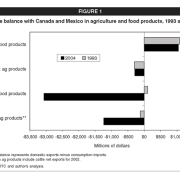3-Jun-2005
Economic Policy Institute
Promoters of the proposed Dominican Republic/Central American Free Trade Agreement (CAFTA) have asserted that it will provide significant benefits to the U.S. economy, especially to the agricultural sector. Similar promises were made in the debate on the North American Free Trade Agreement in 1992 and 1993. However, since that time NAFTA has failed to live up to these promises, and similar promises made for CAFTA are even less likely to be fulfilled.
12-Feb-2005
Public Health Association of Australia
Australia is fortunate to be one of few countries to remain free of BSE, the degenerative
brain disease in cattle that causes the deadly variant CJD in people. But the Free Trade
Agreement recently signed with the United States may change this.





